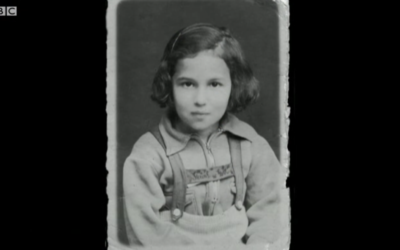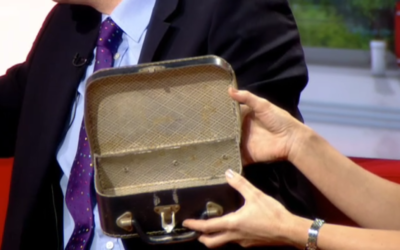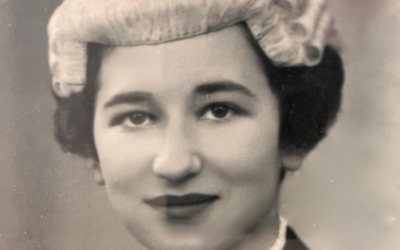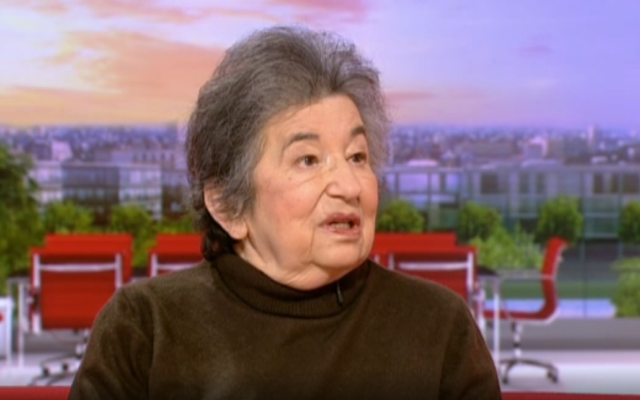Kindertransport refugee who became a judge dies aged 91
Inge Goldrein never saw her father again after she was put on a train in Vienna - but her adoptive English parents encouraged her to study at a time when it was rare and she went all the way to become a judge
A woman who came to Britain as a Kindertranspor refugee and became a judge has died aged 91.
Ingeborg “Inge” Goldrein arrived in London without any clothes at all after being put on a train by her father in Vienna aged eight. She never saw him again.
She was taken in by a family who barely knew even her cousin, and encouraged to study despite the lack of women professionals at the time – and went to the top in a career in the law.
She had been born Inge Schwarze in Vienna in 24 February 1931.

Her mother Anna died of a brain tumour when Inge she was only two but her father Herman realised he would have to get her across the Channel after Kristallnacht, or the Night of Broken Glass, a series of co-ordinated attacks against Jews throughout Nazi Germany and Austria on November 9-10, 1938.
Inge, who retired to Hale Village on Merseyside, said: “There were reduced food rations for Jewish people and you couldn’t go to the park and play.
“My cousins used to take me skating, but then Jewish children were not allowed any more.
“I knew I was going to England, but I didn’t know much else. My father took me to the station and was very controlled. Elsewhere, there was a lot of crying and emotion but, as I recall, he was doing his best to control himself.

“I’ve always been bloody-minded. Everyone was crying, but strangers seeing me cry? Not on your nellie!
“It was a horrible journey. I remember mostly being on my knees in the lavatory, being sick all the way – two days. From Harwich we were taken to Liverpool Street Station in London. I remember rows and rows of seats for us to sit on as we waited to be picked up.”
Her adoptive mother-to-be, Sarah Bernstein, had met Inge’s cousin, who had been taken on as a maid to a Church of England minister in Liverpool.
Sarah and husband Eli gave Inge a home above their wallpaper shop in Granby Street, Toxteth. “At first we had no common language, except a bit of Yiddish,” Inge said. “I got letters [from home]– initially. Sometimes, I am overcome with guilt. Other times, I think ‘I was a child of eight’ . . . This was all new to me and I had so much to learn. I am afraid I was somewhat disloyal. I wasn’t thinking about what I left behind.
“I didn’t know if I had anyone to go back to. Then I learned my father had been deported to Minsk and nothing more had been heard. As Minsk was the killing fields, you can only imagine . ..”
Later, she found out her grandmother had been sent to Treblinka in Poland and, from there, to Auschwitz: “And she didn’t come out of Auschwitz.”
She said in 2013: “The [Kindertransport] operation was a great credit to the British public. More than 10,000 children came to England as long as they had some organisation which would pay £50 – a lot then – and swear an affidavit undertaking not to let the child be a burden on the state. The people who did it were saints.”
She went on to be educated at Peterborough County Grammar School for Girls and St Edmund’s College, Cambridge before she moved to Liverpool, where she graduated from the University of Liverpool in November 1952.

From 1952 until 1991, she worked for Atlantic Chambers – one of the young barristers she gave a placement to was Sir Brian Leveson, later head of the Leveson Inquiry into phone hacking.
She became a recorder in 1978, head of the chambers in 1988, a circuit judge in 1991 and retired in 2001. From 2001–2002, she was director of the Alternative Futures Group, a health and social care charity provider.
She was also a member of the Mental Health Act Commission from 1984-86 and was president of the Mental Health Review Tribunal.
She married Major Eric Goldrein, a war hero and barrister whose life story could also fill several books. She is survived by two children and a grandchild.

Thank you for helping to make Jewish News the leading source of news and opinion for the UK Jewish community. Today we're asking for your invaluable help to continue putting our community first in everything we do.
For as little as £5 a month you can help sustain the vital work we do in celebrating and standing up for Jewish life in Britain.
Jewish News holds our community together and keeps us connected. Like a synagogue, it’s where people turn to feel part of something bigger. It also proudly shows the rest of Britain the vibrancy and rich culture of modern Jewish life.
You can make a quick and easy one-off or monthly contribution of £5, £10, £20 or any other sum you’re comfortable with.
100% of your donation will help us continue celebrating our community, in all its dynamic diversity...
Engaging
Being a community platform means so much more than producing a newspaper and website. One of our proudest roles is media partnering with our invaluable charities to amplify the outstanding work they do to help us all.
Celebrating
There’s no shortage of oys in the world but Jewish News takes every opportunity to celebrate the joys too, through projects like Night of Heroes, 40 Under 40 and other compelling countdowns that make the community kvell with pride.
Pioneering
In the first collaboration between media outlets from different faiths, Jewish News worked with British Muslim TV and Church Times to produce a list of young activists leading the way on interfaith understanding.
Campaigning
Royal Mail issued a stamp honouring Holocaust hero Sir Nicholas Winton after a Jewish News campaign attracted more than 100,000 backers. Jewish Newsalso produces special editions of the paper highlighting pressing issues including mental health and Holocaust remembrance.
Easy access
In an age when news is readily accessible, Jewish News provides high-quality content free online and offline, removing any financial barriers to connecting people.
Voice of our community to wider society
The Jewish News team regularly appears on TV, radio and on the pages of the national press to comment on stories about the Jewish community. Easy access to the paper on the streets of London also means Jewish News provides an invaluable window into the community for the country at large.
We hope you agree all this is worth preserving.






















